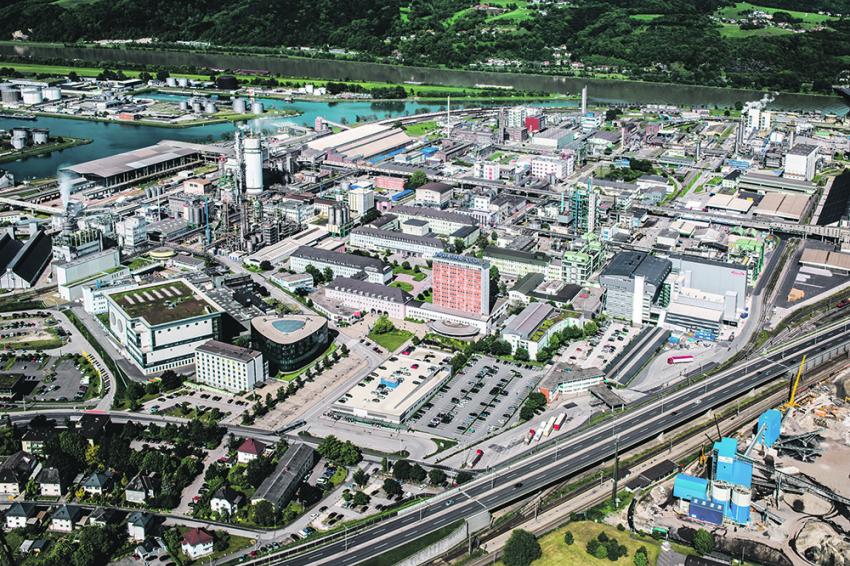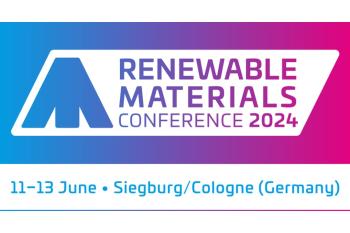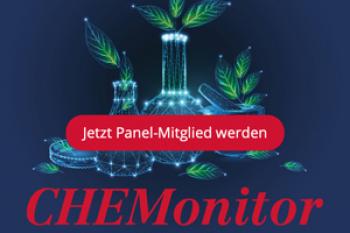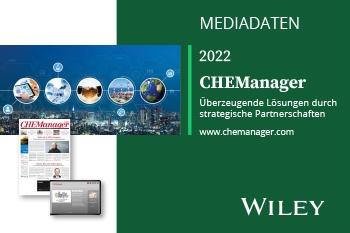ESIM Chemicals Creates Value without Compromise
The Austrian Company Aims to Grow with Quality Intermediates and Fine Chemicals
ESIM Chemicals is a relatively young company, though its origins date back 80 years. The provider of agrochemicals, intermediates and derivatives of maleic anhydride is headquartered in Linz, Austria, and was formed by the merger of DSM Pharmaceutical Products and Patheon in 2014. In the ensuing splitting-up of the companies, the pharma business was consolidated under Patheon while the exclusive synthesis and intermediates business (ESIM) was taken over by Ardian and established as a separate company under the name of ESIM Chemicals which now has around 500 employees and has been owned by Sun European Partners since 2018. In March 2019, Frank Wegener took over as new CEO of ESIM Chemicals. Michael Reubold asked him about the company’s plans and goals for its continued development.
CHEManager: Mr Wegener, the origins of ESIM Chemicals date back 80 years to 1939 when a factory was founded in Linz for the production of nitrogen-based fertilizers. Over time the company earned itself an international reputation, first under the name of Chemie Linz and later as DSM Fine Chemicals. How much of this history can still be felt today?
Frank Wegener: Although ESIM Chemicals is a relatively young company, it can indeed look back on an eventful and colorful history. As one of only a small number of chemical industry companies in Upper Austria the pride is still palpable that employees feel as they enter “their” company every day. Similarly, the “genes” of DSM can still be felt at all times. The long association with the Dutch group has left a lasting impression on our company. Notable examples are the international orientation and the professional structures of a large company active in the chemical industry. “Continuous improvement” has been a key objective for ESIM Chemicals and its predecessor companies for many years, and this is proving particularly profitable with regard to value creation in partnership with our customers in the exclusive synthesis branch who expect the highest standards. Without a culture of continuous improvement, which basically begins with the launch of the first campaign, it would be harder for us to introduce products on the market with such success and to stay ahead of competition from Asia.
Before you came to ESIM you were president of WeylChem for 4 years. Both companies have a long tradition, were formed by mergers or takeovers, operate in similar markets and are now owned by investors. What similarities are there between ESIM and WeylChem and where do they differ?
F. Wegener: Although one could assume that ESIM Chemicals and WeylChem have very similar structures, clear differences very quickly become apparent. It is true that both companies focus on similar customer groups, but their corporate culture and the technology they use differ enormously. One of the great strengths of ESIM Chemicals is without doubt the employees’ expertise: they are accustomed to planning complex syntheses and manufacturing complex products. Because all of the company’s production facilities are close together on one site in Linz it is logical to make the best possible use of the skilled and highly motivated workforce for the purposes of creating value. What ESIM Chemicals and WeylChem have in common is that they originate from groups of companies that sold their fine chemicals work to investors. In the year before last, ESIM Chemicals was sold to Sun European Partners with the aim of developing the company further in cooperation with management. This also includes the business with maleic anhydride and its derivatives, by the way. In recent years, an attractive market has emerged here, principally for a large number of dynamically growing niche products that we continue to develop alongside exclusive synthesis. Our owner supports our efforts here in every way possible.
ESIM’s research and production take place at the Linz site. Have you modernized/added to the equipment recently or is any investment in equipment or new technologies planned?
F. Wegener: ESIM has invested heavily in the recent past and intends to do so in future as well. For instance, we increased the capacity for maleic anhydride by 30% at the end of 2018 by investing in new equipment. For the year 2020, which has just begun, we are planning further heavy investment in a new technology in cooperation with a customer in the agrochemicals sector. This plant will go into operation in early 2021 and will contribute to improved value creation both for the customer and for us. It goes without saying that investment in areas such as environmental protection, automation and digitalization is ongoing. Naturally enough, the investor plays a part in all major projects.
How do you judge the location factors and general environment for chemical companies in Austria with regard to the climate for investments, approval practice and energy/labor costs?
F. Wegener: As a business which, along with our predecessors, has been based in Linz for many years and has been producing a raft of different products of varying complexity during that time, we maintain a constant and close dialogue with the approval bodies. This dialogue takes place with great regularity, openness and cooperative spirit in accordance with the relevant legislation, and that is certainly an advantage of our location. The same applies to the climate for investments: We feel very much that the Austrian government and the government of Upper Austria are extremely keen to create or secure jobs in the chemical industry and to help us make the necessary investments. Because we generate our own power for the production of maleic anhydride, we are only partly dependent on external suppliers and have noted that we are very competitive in this area when compared to other countries. The subject of labor costs is of course relevant to us and the level here is similar to that in Germany. Because exclusive synthesis in particular requires a large number of employees and the labor costs here account for a considerable part of the overall costs, it is almost inevitable that there is a need to address them actively. Consequently, we are working on concepts such as using simulations to minimize empirical experiments in the lab or on pilot systems. We have been doing the same thing for many years with IT-based optimization of existing production plant. We are also increasing investment in automation at present.
How do you assess the situation in your most important markets in terms of applications and sales? Where do you see the biggest challenges at present, and where do you expect good growth opportunities?
F. Wegener: We are of course affected by the situation in the agrochemicals industry which continues to be challenging and is our most important customer industry. However, we remain optimistic and see increasing growth opportunities especially in the launch of new products: in 2019 we achieved growth of over 15% in this market segment. This is where our strengths with regard to complex multistep systems prove decisive in keeping ahead of Chinese and Indian competitors. The subject of “confidentiality” is if course relevant when dealing with patented intermediates and active substances and European suppliers like us undoubtedly have an advantage here. The subject of trust is very important to our customers generally and is an area where we definitely score over our competitors.
Besides established manufacturers for whom ESIM produces fine chemicals you also offer your expertise and capacities to new and smaller companies. Do you see increasing demand for this?
F. Wegener: This is indeed an important issue for us. Small and medium-sized companies with excellent expertise in their markets do not necessarily have the resources and skills to convert their customers’ requirements to products especially when these are complex and generally multistep syntheses. Here we look selectively for partners who are able to enhance the value creation chains in collaboration with us. Demand for this type of specialized partnership is growing in the agrochemical industry sector in particular because development of new products is becoming increasingly complex and therefore more expensive. During the past 2 years we developed an innovative product in the agrochemicals sector with a smaller customer and started producing it in 2018. The market launch followed in 2019. Together with our customer we expect significant growth over the next few years as a result of this partnership which is planned to be long term.
What is the academic situation in the Linz region like – both with respect to partnerships with universities and research institutions and to the availability of young technical and scientific specialists?
F. Wegener: We have had close cooperative ties with universities and institutes all over Europe for many years now. These ties are especially intensive with Austrian universities and institutes owing to their proximity, but we never stop looking beyond regional borders. Like other chemical industry companies, we see ourselves as being in intensive competition for new and young employees for both technical and scientific disciplines, and we have to face this competition. To this end we train most of our technical personnel ourselves, and approximately 10% of our employees consists of people undergoing professional training. We offer all our employees including the scientists working time regulations that go far beyond what is usually agreed. But there is no doubt that competition for the best minds has become tougher, also in Linz which, as a city with attractive surroundings, has much to offer.
What growth strategy will you be pursuing for ESIM in the coming years? What role will your own research and development play in it?
F. Wegener: Growth is one of the most important items on our agenda for the future. The vast majority of our customer industries are growing significantly, and we are happy to support this. For instance, our largest maleic anhydride derivative business has grown by 80% over the last 10 years: that means an average annual growth of around 8%. And we feel that this sector still has potential. In this connection, our research and development activities are important especially for ensuring the sustainability of this growth – in the development of new products and capacities it is energy consumption and aspects of environmental protection that require the most attention.
Do you also keep an eye out for potential acquisitions and how much support does your owner give you with this?
F. Wegener: We regularly look for useful additions to the current set-up of ESIM Chemicals. We are particularly interested in possibilities for geographical and technological expansion, which we need for value creation with customers from the exclusive synthesis sector. Our owner is a leading company in the venture capital sector and has excellent contacts and experience at its disposal. So of course, we exploit these advantages to look for useful additions.












